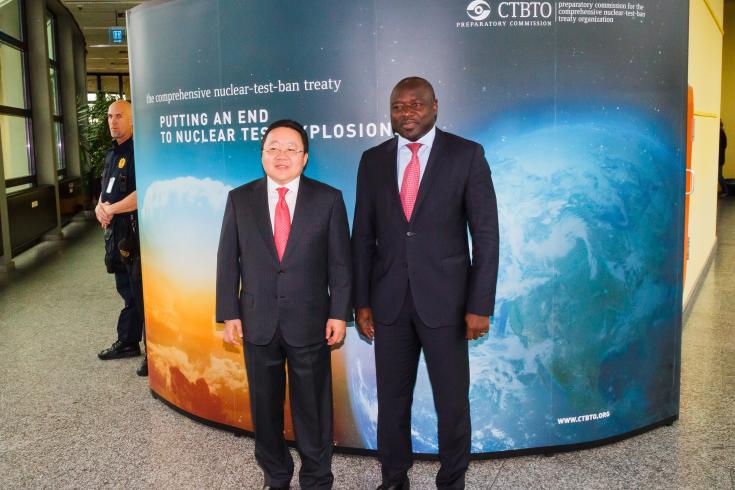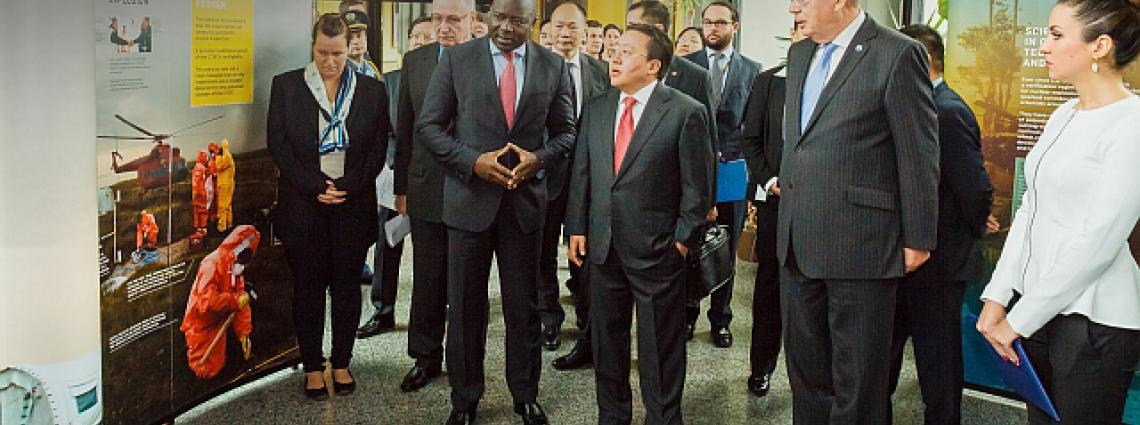Mongolian President to assist with outreach to DPRK, Myanmar
The President of Mongolia, Tsakhiagiin Elbegdorj, visited the Vienna International Centre in Austria on 15 October, where he met with CTBTO Executive Secretary Lassina Zerbo and the heads of other Vienna-based international organizations.
The President was briefed on the work of the different organizations and discussed their cooperation with Mongolia. In view of his country's "excellent diplomatic relations" with the governments the Democratic People’s Republic of Korea (DPRK) and Myanmar, the President of Mongolia offered support to "bridge relations between UN agencies and these countries."
The DPRK is one of eight countries that has yet to sign and ratify the Comprehensive Nuclear-Test-Ban Treaty (CTBT) before it can enter into force. The other seven are China, Egypt, India, Iran, Israel, Pakistan and the United States. The DPRK is also the only country to have conducted nuclear tests since the turn of the century.
The President was briefed on the work of the different organizations and discussed their cooperation with Mongolia. In view of his country's "excellent diplomatic relations" with the governments the Democratic People’s Republic of Korea (DPRK) and Myanmar, the President of Mongolia offered support to "bridge relations between UN agencies and these countries."
The DPRK is one of eight countries that has yet to sign and ratify the Comprehensive Nuclear-Test-Ban Treaty (CTBT) before it can enter into force. The other seven are China, Egypt, India, Iran, Israel, Pakistan and the United States. The DPRK is also the only country to have conducted nuclear tests since the turn of the century.

Putting an end to nuclear testing: Mongolia's President Tsakhiagiin Elbegdorj (left) and Executive Secretary Lassina Zerbo
I support the denuclearization efforts on the Korean Peninsula and am ready to enter into a dialogue with the DPRK. If invited, I would visit the country to explain the many benefits that come with the CTBT.
As one of the few States in Southeast Asia that has not ratified the CTBT, Myanmar is also a country of outreach interest to the CTBTO. Zerbo thanked President Elbegdorj for his offer to bridge relations with the DPRK and Myanmar and expressed his intention to deepen the already excellent cooperation between Mongolia and the CTBTO.
The Executive Secretary also expressed his appreciation for the support for the CTBT's implementation pledged by Mongolia's Minister of Foreign Affairs, Luvsanvandan Bold, whom he met at the General Assembly in New York in September. Mongolia signed the CTBT in October 1996 and was one of the first countries to ratify in August 1997. The country hosts four certifed and operational International Monitoring System facilities, see interactive map. In 1992, Mongolia declared itself a one-State nuclear-weapon-free zone, which was recognized by the UN General Assembly in 2000 through resolution 55/33S.
The Executive Secretary also expressed his appreciation for the support for the CTBT's implementation pledged by Mongolia's Minister of Foreign Affairs, Luvsanvandan Bold, whom he met at the General Assembly in New York in September. Mongolia signed the CTBT in October 1996 and was one of the first countries to ratify in August 1997. The country hosts four certifed and operational International Monitoring System facilities, see interactive map. In 1992, Mongolia declared itself a one-State nuclear-weapon-free zone, which was recognized by the UN General Assembly in 2000 through resolution 55/33S.
16 Oct 2014
